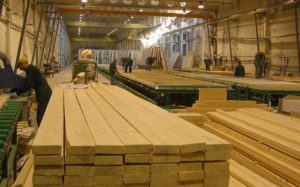
Forest or wood-based industries are defined as those that rely on forests for their raw material requirements. India is one of the top countries in terms of the proliferation of wood-based businesses, such as pulp and paper, match, saw wood, veneer and plywood, pencil, and dendro biomass.
With rising demand for furniture, housing, construction materials, packaging, agriculture goods, sports goods, plywood, veneer, matches, and other forest-based products, the forest-based business is quickly expanding. Similarly, biomass-based power generation is becoming more popular across the country as a means of generating electricity from forest biomass.
Related Projects:- Wood and Wood Products, Plywood, Board, Particle Board, Wooden Furniture, Bamboo, Engineered wood, Forest product, Lumber, Tree, Wood drying, Wood plastic composite, Door, Window, Modular Furniture, Timber, Woodworking, Decorative Laminated Sheets
By 2020, the increased demand for wood and wood-based industries will result in a 20-70 million cubic meter wood shortfall.
Outside forest regions supply approximately 40% of forest products, while more than 95% of fuelwood and main timber requirements are sourced from outside forest areas. The following are some of the most important forest-based sectors that rely significantly on forest and agroforestry plantations to supply their raw material needs.
Start a Business in Africa, Click Here
Start a Business in India, Click Here
1. Pulp and Paper Industry:

Pulp and Paper Businesses- One of India's most important industries, the pulp and paper industry is severely fragmented. In India now, there are approximately 700 paper mills, with 33 in the large-scale industry. In the 1990s, per capita, paper consumption was 3.3 kg, which has already risen to 8 kg but is still lower than the global average of 47.7 kg. The present raw material production for pulp and paper manufacturing is 2.76 million tonnes, compared to a demand of 5.04 million tonnes. The gap might be as much as 45%.
The country's total installed capacity of pulp and paper mills is predicted to be around 7.5 million tonnes, with the capacity expected to rise to 14 million tonnes by 2020. Paper is made in India from a variety of raw materials, including wood, recovered paper, bagasse, and other agricultural waste.
2. Timber and Sawn Wood Industries:

For all of their residential and industrial wood needs, residents in the country have traditionally relied on timber and other converted wood. Wood was used more in furniture, housing, and construction materials as a result of fast population increase, urbanization, and industrialization. Between 2010 and 2012, more than 500 million square feet of space was anticipated to be developed in the country's urban centers, with wood goods valued at roughly $3 billion.
With the increased use of wood as a primary building and construction material in urban and semi-urban regions, there will be a high demand for timber and other sawn wood products. The Indian furniture market is estimated to be worth 8 billion dollars, with the majority of raw materials coming from other countries.
Best Industry for Doing Business, Click Here
Start a Business in Asia, Click Here
3. Plywood Industries:

Related Books:- Wood, Bamboo, Coal, Lignin And Its Derivatives
The plywood industry is one of India's fastest expanding. Plywood has seen a lot of use in the country as a result of industrialization and urbanization, as well as a growing interest in interior decor. A wide range of species has been discovered to be suitable for making face, core, and inner veneers, resulting in the formation of over 2,000 small-scale plywood manufacturing businesses. The Indian government's liberalization and privatization policies have also aided in the development of new rural industries. These industries are likewise significantly reliant on a variety of species, which has resulted in widespread support of plywood-based industrial wood plantations.
4. Fibre Board Industries:

Related Video:- Wood and Wood Products, Plywood, Particle Board, Wooden Furniture, Bamboo, Forest Product, Wood Plastic Composite, Timber and Woodworking
Fibreboard is made up of a wide variety of sheet materials made from refined or partially refined wood fibers or other vegetable fibers.
Start a Business in Potential Countries for Doing Business, Click Here
Start a Business in Middle East, Click Here
5. Oil and Biodiesel Industries:

Due to industrial and economic development, the need for edible and non-edible oil is always increasing. However, there is no parallel effort to increase the country's oilseed production potential. This resulted in a vast import of nearly 46% of edible oil until recently, consuming a large portion of the country's revenue. Similarly, as the country's transportation and industrial sectors improve, the country's crude oil demand grows.
Frequently Asked Questions:
Here are some frequently asked questions (FAQs) on forest-based industry business ideas:
1. What are Some Popular Forest-Based Business Ideas?
- Popular forest-based business ideas include timber harvesting and processing, furniture manufacturing, paper and pulp production, eco-tourism ventures like nature resorts and guided forest tours, and sustainable forestry consulting.
2. How Can I Start a Timber Harvesting Business?
- Starting a timber harvesting business typically involves acquiring land or timber rights, investing in logging equipment, hiring trained personnel, and complying with local forestry regulations. You may also need to develop relationships with buyers in the timber industry.
3. What are the Sustainability Considerations for Forest-Based Businesses?
- Sustainable forest management is crucial for the long-term viability of forest-based businesses. This involves practices like selective logging, reforestation, and minimizing environmental impact. Certification programs like FSC (Forest Stewardship Council) can help showcase your commitment to sustainability.
4. How Can I Finance a Forest-Based Business Venture?
- Financing options for forest-based businesses can include personal savings, loans from banks or financial institutions, venture capital, grants from forestry organizations or government agencies, and partnerships with investors.
5. What Permits and Licenses are required for Forest-Based Businesses?
- The specific permits and licenses you need can vary depending on your location and the nature of your business. Typically, you will need harvesting permits, environmental impact assessments, and compliance with forestry regulations. Consult with local authorities and forestry agencies for guidance.
6. Are there Opportunities in Eco-Tourism Related to Forests?
- Yes, eco-tourism related to forests is a growing industry. You can create forest resorts, offer guided wildlife tours, bird watching expeditions, or tree house accommodations. Eco-tourism can promote forest conservation while generating income.
7. What are the Environmental Benefits of Forest-Based Businesses?
- Forest-based businesses can contribute to carbon sequestration, biodiversity conservation, and cleaner air and water. Sustainable forestry practices can help mitigate deforestation and promote ecosystem health.
8. How Can I Market My Forest-Based Products or Services?
- Marketing strategies for forest-based businesses can include creating a strong online presence, participating in trade shows and forestry expos, targeting eco-conscious consumers, and highlighting the sustainable and eco-friendly aspects of your products or services.
9. What are Some Challenges in the Forest-Based Industry?
Challenges in the forest-based industry can include market fluctuations, environmental regulations, the need for sustainable practices, competition, and dealing with issues related to land ownership and logging permits.
Remember to conduct thorough research and seek professional advice before starting any forest-based business to ensure its success and sustainability. Additionally, stay informed about changing regulations and market trends in the forestry sector.
At NPCS, we strive to make the market selection an easy process for any entrepreneur or start-up. Our expert team has compiled a list of profitable projects for entrepreneurs looking to diversify or venture, based on their dexterity and decades of expertise in the industry. In the industrial world, NIIR PROJECT CONSULTANCY SERVICES (NPCS) is a trusted brand for providing advanced strategic consultancy services. Engineers, architects, specialists, accounting advisors, economic researchers, and architecture specialists with vast expertise in relevant industries make up the NPCS team.
PM_Art2021
#furniture #forestbusiness #forestindustry #forestIndia #papermill #paperindustry #pulpandpaper #business #industrial #fmcg #paperindustry #sustainabledevelopment #PaperIndustry #automation #digitalization #papermills #pulpandpaper #IndianPaperMills #PaperMillsinIndia #IndianPaperManufacturers #TopPaperCompanies #businessplan #business #entrepreneur #businesstips #businessowner #businessgrowth #businessmindset #startup #businessgoals #businessstrategy #marketing #businessdevelopment #entrepreneurship #businesssuccess #businesscoach #motivation #businesstip #smallbusiness #businessplanning #businessadvice